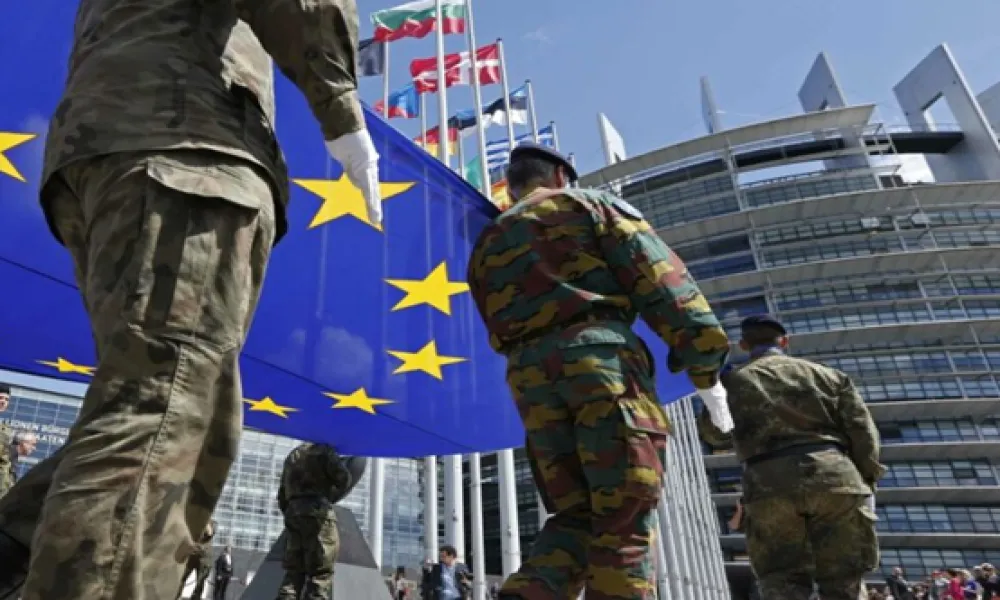Cyprus is entering the final stage of selecting the projects it will submit by November 30 for inclusion in the European Union’s SAFE (Support to Ammunition and Defence Equipment) funding program. The project list will also be discussed at the Cyprus Defence Industry Council, chaired by the Minister of Defence and including as members the presidents of the Cyprus Chamber of Commerce and Industry (KEBE), the Employers & Industrialists Federation (OEV), and the Defence Industry Association.
The EU funding tool, designed to strengthen member states’ joint defense capabilities, offers Cyprus access to up to €1.18 billion in preferential loans. While the interest rate has not yet been finalized, it is expected to be low for all participating member states.
Flagship projects for Cyprus
The key projects for Cyprus are the upgrade of the Andreas Papandreou Air Base in Paphos and the Mari Naval Base. These two facilities are considered critical points in the defence infrastructure network of the Eastern Mediterranean, providing strategic support for surveillance operations, humanitarian missions, and maritime security.
The airbase upgrade is expected to include runway expansions, new UAV (unmanned aerial vehicle) support facilities, and improved monitoring and security systems. At Mari, the upgrade plan focuses on expanding port facilities, adding new fuel storage, implementing fire protection systems, and integrating digital connections with the European Maritime Surveillance System (MARSUR).
Discussions with the United States and France are ongoing regarding their potential participation in funding these upgrades. If these agreements materialise, the projects will be removed from the SAFE submission list.
The European Commission will evaluate these national plans, with initial disbursements expected in early 2026.
Local industry
Special emphasis is being placed on the involvement of Cypriot companies, as the local defence ecosystem shows strong potential in developing drones, telecommunications systems, and other defence equipment.
Projects under SAFE require collaboration with at least one other member state. According to local sources, cooperation agreements are already in place with France and Greece, with discussions underway with Poland and the Czech Republic.
SAFE funding and these international collaborations could help establish a comprehensive defence industry ecosystem in Cyprus.
Panayiotis Chatzipavlis, Director of Armaments and Defense Capabilities Development at the Ministry of Defence, noted that the goal is to involve as many Cypriot defence technology companies as possible in SAFE-funded projects, both independently and through partnerships with major European firms.
The SAFE programme
SAFE was created in response to defence challenges arising from Russia’s invasion of Ukraine. A total of €150 billion will be allocated across 19 member states that have expressed interest in receiving loans.
The programme is the EU’s primary tool to move from fragmented national defence procurement policies toward a collective, pan-European strategic cooperation model. Participating member states commit to investing in joint procurement of weapons systems, ammunition, and technological equipment, involving the European defence industry. The goal is to ensure operational interoperability of European armies and strengthen the continent’s industrial base, reducing dependency on non-European suppliers.
SAFE provides loans under sustainable conditions, provided that funded investments generate European added value - either through cross-member collaboration or participation of European defence companies. For smaller states like Cyprus, SAFE enables a transition from national infrastructure to regional strategic hubs.
The case of Turkey
SAFE is also open to third countries, but Cyprus and Greece have informally vetoed funding for the Turkish state and its defence industries. Both countries can block funding at the Coreper level (Committee of Permanent Representatives, which prepares EU Council work).
Turkey, an EU accession country, has expressed interest in joining SAFE and has criticized the positions of Cyprus and Greece. Athens and Nicosia maintain their stance, insisting that funding should not threaten the security of other EU member states.
The recent European Council conclusions (October 23) reference the special nature of security and defence issues in certain member states, ensuring that the interests of all member states are considered.
“The above does not affect the special character of the security and defence policy of certain member states and takes into account the security and defence interests of all member states, according to the Treaties,” the conclusions state, addressing Greece and Cyprus’ concerns.
SAFE participation for Turkey would be indirect, as in the case of Italy’s Leonardo, which has a 30.2% state stake and joint ventures with Turkey’s Baykar for unmanned systems. Blocking Leonardo’s funding would require managing Italy’s response.
Cyprus also acknowledges NATO as a key actor, noting that Turkey is the Alliance’s second-largest military force after the United States.
“No third country that occupies territory or threatens the security of member states may participate or access EU defence funding,” said President Nicos Christodoulides after the summit.
This remains a delicate diplomatic balance, as a veto has value only if not exercised. Whether Turkey’s participation in SAFE will be accompanied by concessions toward Greece and Cyprus remains to be seen.
Greece and Cyprus’ position is broadly supported by other member states, which also prefer to limit third-country access to EU resources. European Council President António Costa has publicly advocated for excluding Turkey.
“SAFE rules are clear. It is open to third countries only if they do not pose a threat to the security of any member state. A third country must sign a defence agreement approved by all member states to use SAFE,” he said during his visit to Cyprus in September.
